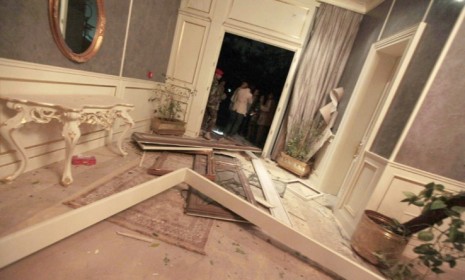Where are Moammar Gadhafi's billions?
Everybody knows Gadhafi siphoned off much of Libya's oil wealth. But many don't realize just how massive his fortune really was

A free daily email with the biggest news stories of the day – and the best features from TheWeek.com
You are now subscribed
Your newsletter sign-up was successful
The hunt for Moammar Gadhafi may be over, but the hunt for his hidden riches is still underway. During Gadhafi's 42 years in power, the late Libyan leader diverted a "staggering" fortune from the oil-rich country's wealth to his personal accounts, along with those of his family and members of his tribe. Where did all the money go? Here, a brief guide:
How much money did Gadhafi have?
A startling amount. While Gadhafi was still clinging to power, he and his family were believed to have stashed between $33 billion and $60 billion around the world. But now that the trails of his assets — everything from sprawling estates in New Jersey, London, and Spain, to a 2 percent stake in Fiat and piles of gold bullion in Libya — are really being scrutinized, the estimates have ballooned to more than $200 billion. That would have made Gadhafi the richest man in the world, by far, with as much wealth as Bill Gates, Warren Buffett, and Carlos Slim combined. "No one truly appreciated the scope of it," said one person who has examined documents involved in the asset search, as quoted in the Los Angeles Times.
The Week
Escape your echo chamber. Get the facts behind the news, plus analysis from multiple perspectives.

Sign up for The Week's Free Newsletters
From our morning news briefing to a weekly Good News Newsletter, get the best of The Week delivered directly to your inbox.
From our morning news briefing to a weekly Good News Newsletter, get the best of The Week delivered directly to your inbox.
Where did he get all that money?
Oil, for starters. For four decades, Gadhafi enjoyed uncontested control over Libya's oil reserves — the largest in Africa. Libya is the 12th largest oil exporter in the world. Gadhafi also siphoned off as much as he wanted from whatever the Libyan state collected through foreign investments and aid. Unlike other oil-rich leaders, such as Saudi Arabia's King Abdullah, Gadhafi didn't spend much on schools, hospitals, and other infrastructure. Nor did he use the wealth to develop other industries to diversify Libya's economy. He used some of the money to buy support from other African leaders, and the rest he essentially put into his own pocket.
What did he do with such unfathomable riches?
Personally, not much. Gadhafi lived relatively modestly, and tried to stay close to his nomadic roots by living in tents — even, when possible, during state visits abroad. Gadhafi's kids, however, were a different story, says Robert Powell of the Economist Intelligence Unit. "His children generally went a little bit off the rails and really enjoyed the high life," says Powell, as quoted by ABC News. Unlike dad, they bought big private yachts, planes, and real estate throughout Europe.
A free daily email with the biggest news stories of the day – and the best features from TheWeek.com
Can Libya's new government get the money back?
Possibly, but it won't be easy. The country's National Transitional Council has to find the hidden riches first. A good chunk of it is stashed in investments spread out in just about every major country in the world. Unraveling the tangled web of partial ownership and shadowy intermediaries, says former State Department official Jonathan Winer, as quoted at IBN Live, then deciding what goes to Libya's government and what goes to Gadhafi's victims, will be "an unholy mess to sort out."
Sources: ABC News, Business Insider, Daily Mail, IBN Live, LA Times
-
 Why are election experts taking Trump’s midterm threats seriously?
Why are election experts taking Trump’s midterm threats seriously?IN THE SPOTLIGHT As the president muses about polling place deployments and a centralized electoral system aimed at one-party control, lawmakers are taking this administration at its word
-
 ‘Restaurateurs have become millionaires’
‘Restaurateurs have become millionaires’Instant Opinion Opinion, comment and editorials of the day
-
 Earth is rapidly approaching a ‘hothouse’ trajectory of warming
Earth is rapidly approaching a ‘hothouse’ trajectory of warmingThe explainer It may become impossible to fix